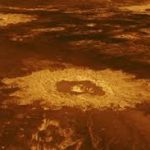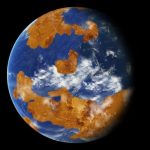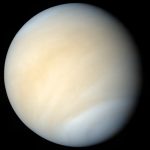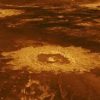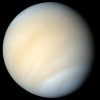In the search for alien life, astrobiologists have turned over all sorts of rocks. For example, Mars has geological features that suggest it once had subsurface liquid water. Scientists have also eyed Jupiter’s moons Europa, Ganymede and Callisto as well as Saturn’s Titan and Enceladus as possible havens for life in their subsurface oceans. Now, University of Wisconsin–Madison planetary researcher Sanjay Limaye and colleagues are dusting off an old idea that promises a new vista in the hunt for extraterrestrial life — the clouds of Venus. According to the team, the lower cloud layer of Venus (altitudes between 30 and 32 miles, or 47.5-50.5 km) is an exceptional target for exploration due to the favorable conditions for microbial life, including moderate pressures (one atm) and temperatures (140 degrees Fahrenheit, or 60 degrees Celsius), and the presence of sulfuric acid aerosols.


